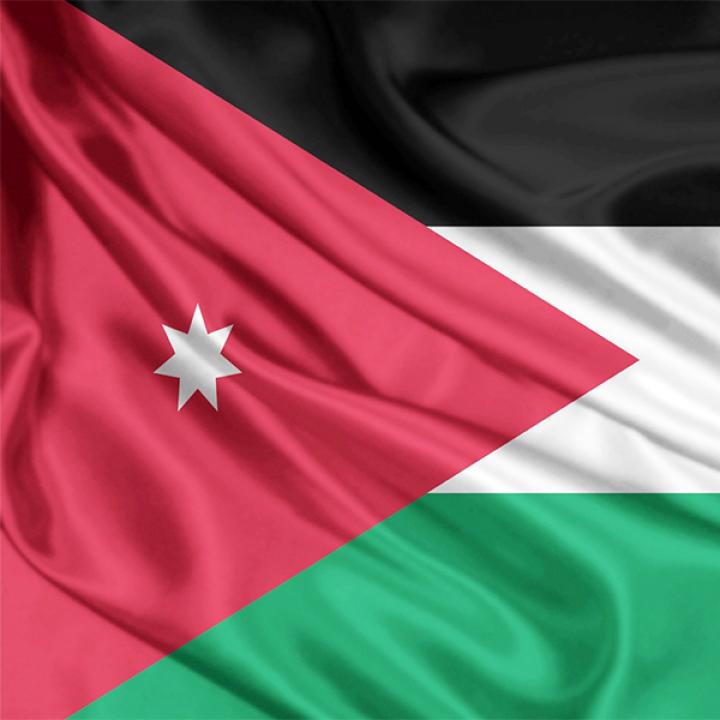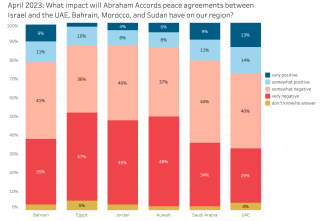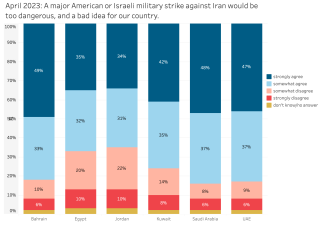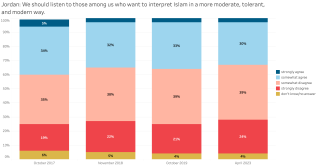
- Policy Analysis
- Fikra Forum
New Public Opinion Poll: Jordanians Favor De-escalation in the Region, But Sentiment Against Israel Remains

In a new public opinion poll, commissioned by the Washington Institute and conducted in March/April by an independent regional firm, Jordanian citizens demonstrate a strong aversion toward Israel but remain in favor of regional de-escalation.
Despite being officially at peace with Israel for almost three decades, a solid majority (84%) of Jordanians across all age groups stand opposed to having business deals with Israeli companies even if it would help their economy. This data is consistent with Jordanian attitudes documented in past polls between July 2020 and March 2022.
Jordanians also remain steadfastly opposed to other sorts of cooperation with Israel, including receiving humanitarian aid from Israel even in dire circumstances. Three-quarters (76%) of respondents agreed with this statement: “in case of an earthquake or other natural disaster, as we just saw in Syria and Turkey, Arab countries should refuse any humanitarian aid from Israel.”
Moreover, a majority (60%) of Jordanians view Hamas firing missiles at Israel at least somewhat positively, whereas a minority of 37% of Jordanians consider such actions to be negative for the region. Jordanian respondents are also heavily supportive of mass protests against Netanyahu’s right-wing government in Israel, with 72% considering at least a somewhat positive development. Compared to more positive opinions in Gulf states, only about half as many (12%) Jordanians perceive the Abraham Accords positively.
Regional De-escalation is Welcomed, But Iran Remains an Enemy or Competitor
Jordanian attitudes toward Iran yielded mixed results, emphasizing the threat posed by Iran but also revealing limited support on actions against it. For instance, Jordanians generally welcome the recent regional de-escalation wave, with 53% viewing Saudi Arabia’s restoration of relations with Iran in a positive light. Yet such results are tempered by the fact that a sizable minority (44%) assess this Saudi-Iranian détente negatively. Similarly, an overwhelming majority of Jordanians perceive Iran as a competitor (45%) and an enemy (42%). Nevertheless, they remain averse to any major U.S. or Israeli attacks against Iran, with almost two-thirds believing that it would be too dangerous and a bad idea. Such attitudes are common in other concurrent TWI Arab public opinion polls. Similarly, just 13% believe that the United States should prioritize doing “more to help counter the threats we face from Iran” when compared to other policy priorities.
Support for de-escalation extends to recent Arab governments’ normalization of relations with Assad, with 58% of Jordanians feeling it was at least somewhat positive. In another show of support for de-escalation, 53% of Jordanians welcome the maritime deal between Israel and Lebanon as a positive development, though a considerable minority (44%) view it negatively.
In addition, Jordanian attitudes on Arab cooperation with Israel to combat Iran are largely negative, with 69% disagreeing with the prospect of cooperation. Similarly, and despite Iran’s nuclear ambitions, the majority (59%) of Jordanians also oppose the idea of an Arab country acquiring a nuclear bomb to counter Iran.
Views Remain Split on Mass Protests, Even After Four Officers Killed
While World Bank’s indicators point towards an economic upswing, Jordanians’ opinions remain divided on the statement: “it is a good thing we don’t has mass street protests against corruption, as in some other Arab countries,” with a slim majority (51%) agreeing and 47% disagreeing at least somewhat. This result aligns somewhat with three previous polls conducted between July 2020 and March 2022, with attitudes holding effectively steady even after the December 2022 countrywide protests triggered by rising fuel prices resulted in the killing of four officers.
United States and Russia Tie as Partners, China Seen as Economic Ally
Jordanians share similar views on China to those of their regional counterparts—a majority (65%) of Jordanians consider China an economic partner. China scores well below its competitors —the U.S. and Russia— on other fronts, as only 18% of Jordanians perceive China as a friend of their country while 10% view China as a security partner. The majority perception of China in economic terms stands in contrast to views on Russia and the United States, which are more diverse.
When it comes to being seen as a friend to Jordan, the United States ties with Russia; 24% of Jordanians said Washington is a friend compared to 22% who said the same of Moscow. The margin hardly widens when it comes to perceptions of security partnerships. A quarter of respondents view Russia as a security partner compared to 31% who see the United States primarily in that role. According to this and previous March 2022 polling—where Jordanians were asked which country “can best help protect us against foreign enemies”—the United States maintains a slight edge over Russia when it comes to Jordanian perceptions of bilateral security partnerships.
Attitudes are flipped when it comes to viewing the two primarily as an economic partner. Only 37% of Jordanians think of the U.S. as an economic partner as compared to 47% who say so of Russia. And in a puzzling finding, 78% of Jordanians agree with the statement: “in the war going on now between Russia and Ukraine, the best outcome would be a Russian victory, including the annexation of a significant Ukrainian territory to Russia.” This could be an indication of Russian media influence in the region as well as the weakening appeal of the Western narrative. It could also be linked to the fact that 41% of Jordanians would like the U.S. to prioritize resolving the Palestinian-Israeli conflict over other issues. The Ukraine war might be seen as a distant conflict while the Palestinian-Israeli conflict is next door, hence the emphasis on prioritizing the Palestinian-Israeli conflict and accepting potential annexation of Ukrainian territory.
Just One-Third Now Support More Moderate Interpretation of Islam
When asked whether “we should listen to those among us who want to interpret Islam in a more moderate, tolerant, and modern direction,” just one-third of Jordanians agreed with this notion, the lowest point since asking this question for the first time in October 2017. Now, 63% disagree at least somewhat with such a notion. This decline may, however, be an artifact of the poll’s timing during Ramadan this year, in contrast to previous polls on this question.
Methodological Note
This analysis is based on findings from a survey among a representative, random national sample of 1,000 Jordanian citizens. Sample selection followed standard geographic probability procedures, yielding a statistical margin of error of approximately 3 percent. The survey was conducted by a highly qualified, experienced, and completely apolitical regional commercial firm. Strict quality controls and assurances of confidentiality were provided throughout. Additional details, including full question wording and data set with demographic breaks, are available on our interactive polling platform.



